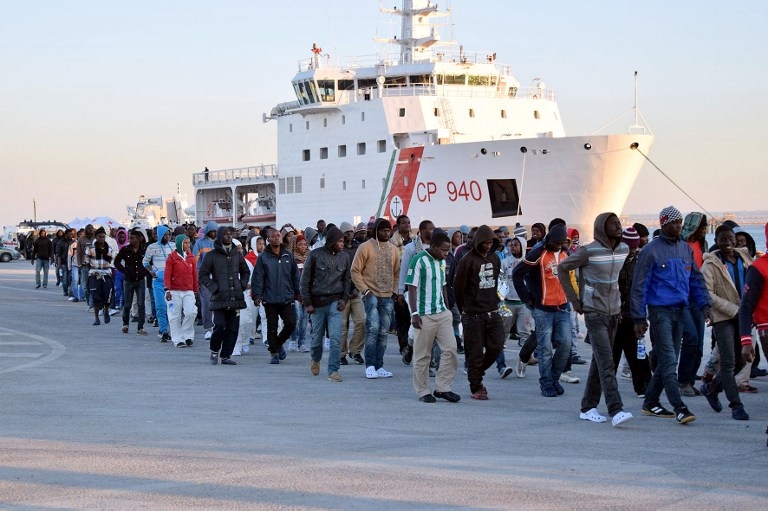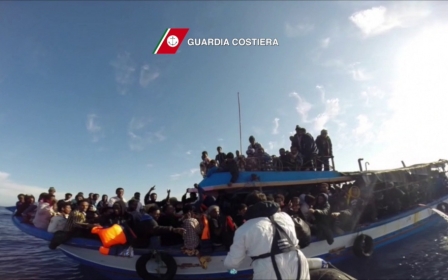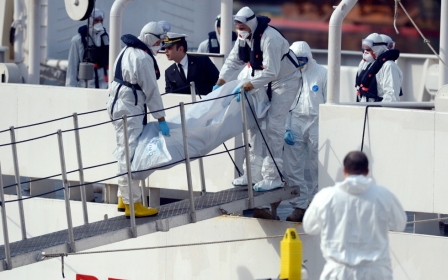Boat carrying 300 across Mediterranean sending distress signals

A sinking boat, thought to be carrying more than 300 people across the Mediterranean Sea, is sending out distress signals, the International Organisation for Migration (IOM) is reporting.
News of the latest incident at sea comes after at least 800 people were feared to have drowned on Saturday when an overcrowded boat capsized off Libya. Survivors have since said that some 900 people could have been on the vessel. This included between 40 to 50 children and 200 women, survivors told Italian media.
On Monday, the IOM chief William Lacy Swing called for the immediate restoration of Mare Nostrum, an Italian navy search-and-rescue operation which was stopped last year due to operating costs and political pressure to curb the flow of migration via the perilous Mediterranean crossing from war-torn Libya.
Swing also urged other European countries to support the operation.
EU ministers headed on Monday into crisis talks to discuss what a UN refugee agency UNHCR spokeswoman called "the worst massacre ever seen in the Mediterranean".
Carlotta Sami, the UNHCR spokeswoman, said survivors' testimonies suggested there had been around 700 people on board the 20-metre (70-foot) fishing boat when it keeled over in darkness overnight. Early Tuesday, however, Sami revised those numbers. "We can say that 800 are dead," she said.
But a Bangladeshi survivor, who was taken to hospital by helicopter in Sicily, put the numbers on board at 950, and said 200 women and nearly 50 children had been among them, according to prosecutors in the Italian city of Catania.
Only 28 people are thought to have survived the wreck, Italian coastguard officials said.
The latest disaster comes after a week in which two other migrant shipwrecks left an estimated 450 people dead, with increasing boatloads coming from Libya as the North African country falls deeper into chaos.
He said that Triton, a much smaller EU-run operation that replaced the Italian one, was "not adequate".
"They don't have a mandate, they're a border protection agency, not a life-saving agency," he said, adding that Triton was not patrolling in the deep waters of the Mediterranean and did not have sufficient equipment.
Italy scaled back Mare Nostrum after failing to persuade its European partners to help meet its operating costs of $9.7 million a month amid divisions over whether the mission was unintentionally encouraging migrants to attempt the crossing.
However, Swing dismissed the claims and urged European countries to support the programme.
"There are 27 other members of the European Union, surely we can share responsibility for this and it would not cost anybody too much," he said.
EU foreign ministers were set to discuss the immigration disaster at a previously scheduled meeting in Luxembourg later on Monday. EU president Donald Tusk was considering holding a special summit on the crisis, his spokesman told AFP.
Tusk, the Polish prime minister, said on Twitter that he "will continue talks w/ EU leaders, Commission & EEAS (EU diplomatic service) on how to alleviate situation".
Member states Spain, Greece, Germany and France urged immediate action, with Italian Prime Minister Matteo Renzi leading calls for a summit by the end of the week.
Western governments and international funding bodies, including the International Monetary Fund and the World Bank, have come under criticism from some corners for turning a blind eye to a migration challenge which some argue their policies created.
"Migration illustrates one of the signal features of modern life, which is malice by proxy," said Anders Lustagarten in an opinion piece in The Guardian last week.
"Like drones and derivatives, migration policy allows the powerful to inflict horrors on the powerless without getting their hands dirty," he wrote.
Stay informed with MEE's newsletters
Sign up to get the latest alerts, insights and analysis, starting with Turkey Unpacked
Middle East Eye delivers independent and unrivalled coverage and analysis of the Middle East, North Africa and beyond. To learn more about republishing this content and the associated fees, please fill out this form. More about MEE can be found here.




